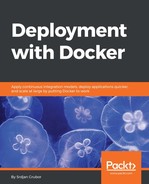As part of a drive to increase the security of deployments, a tool was released by Docker that can help easily identify the most common security issues with a host running a Docker Engine called Docker Bench for Security. This tool will scan and verify a large number of possible weaknesses in your configuration and will present them in a very easy-to-read listing. You can download and run this image just like you would one of the other regular containers available on Docker Hub:
$ docker run --rm
-it
--net host
--pid host
--cap-add audit_control
-e DOCKER_CONTENT_TRUST=$DOCKER_CONTENT_TRUST
-v /var/lib:/var/lib
-v /var/run/docker.sock:/var/run/docker.sock
-v /usr/lib/systemd:/usr/lib/systemd
-v /etc:/etc
docker/docker-bench-security
# ------------------------------------------------------------------------------
# Docker Bench for Security v1.3.3
#
# Docker, Inc. (c) 2015-
#
# Checks for dozens of common best-practices around deploying Docker containers in production.
# Inspired by the CIS Docker Community Edition Benchmark v1.1.0.
# ------------------------------------------------------------------------------
Initializing Mon Oct 2 00:03:29 CDT 2017
[INFO] 1 - Host Configuration
[WARN] 1.1 - Ensure a separate partition for containers has been created
[NOTE] 1.2 - Ensure the container host has been Hardened
date: invalid date '17-10-1 -1 month'
sh: out of range
sh: out of range
[PASS] 1.3 - Ensure Docker is up to date
[INFO] * Using 17.09.0 which is current
[INFO] * Check with your operating system vendor for support and security maintenance for Docker
[INFO] 1.4 - Ensure only trusted users are allowed to control Docker daemon
[INFO] * docker:x:999
[WARN] 1.5 - Ensure auditing is configured for the Docker daemon
[WARN] 1.6 - Ensure auditing is configured for Docker files and directories - /var/lib/docker
[WARN] 1.7 - Ensure auditing is configured for Docker files and directories - /etc/docker
[INFO] 1.8 - Ensure auditing is configured for Docker files and directories - docker.service
<snip>
[PASS] 2.10 - Ensure base device size is not changed until needed
[WARN] 2.11 - Ensure that authorization for Docker client commands is enabled
[WARN] 2.12 - Ensure centralized and remote logging is configured
[WARN] 2.13 - Ensure operations on legacy registry (v1) are Disabled
[WARN] 2.14 - Ensure live restore is Enabled
[WARN] 2.15 - Ensure Userland Proxy is Disabled
<snip>
[PASS] 7.9 - Ensure CA certificates are rotated as appropriate (Swarm mode not enabled)
[PASS] 7.10 - Ensure management plane traffic has been separated from data plane traffic (Swarm mode not enabled)
The list is pretty long, so most of the output lines were removed, but you should have a pretty good idea about what this tool does and how to use it. Note that this is not the only product in this space (e.g. Clair from CoreOS at https://github.com/coreos/clair) so try to use as many of them as you can in order to see where your weaknesses in the infrastructure lie.
